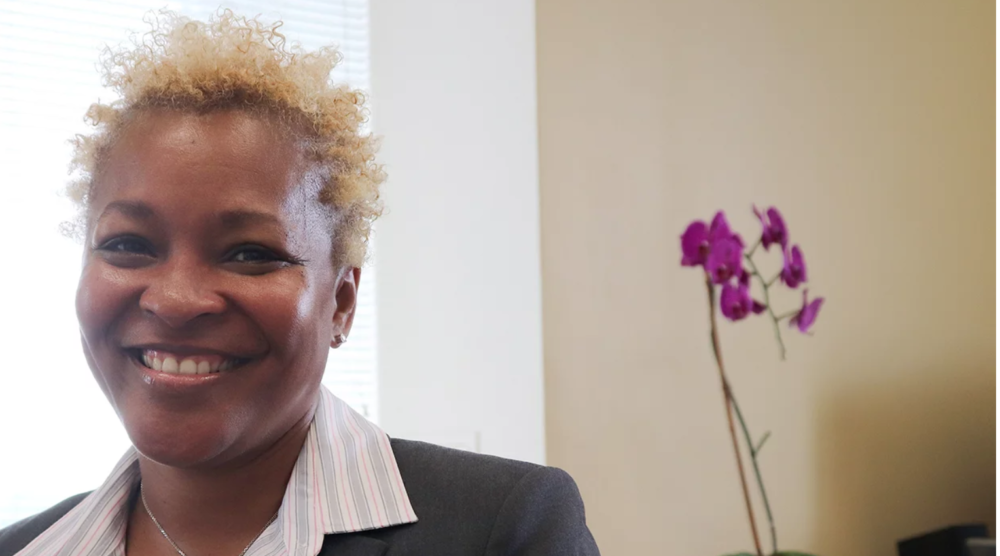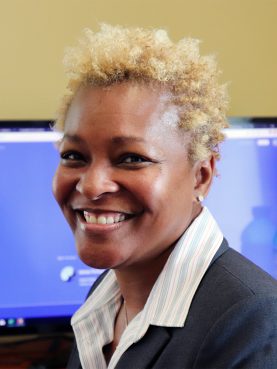
New York Theological Seminary President LaKeesha Walrond on June 25, 2019. RNS photo by Adelle M. Banks
Sitting in her office on Manhattan’s far west side, the new president of New York Theological Seminary, the Rev. LaKeesha Walrond, recalled how she once was reprimanded as a youth for crossing the pulpit area of her church during a choir rehearsal.
Back then, she was taught, and believed, that women could not be preachers. After a career as an educator, executive pastor of a Harlem megachurch and, since June 3, the first African American woman president of the 119-year-old seminary, Walrond sees her trajectory as a sign that “God had this plan.”
After serving at First Corinthian Baptist Church, where her husband, the Rev. Michael A. Walrond Jr., is senior pastor, she views her leadership of a 300-student multidenominational seminary focused on urban ministry as a reason for hope for other women.
Walrond, 47, spoke with Religion News Service about her diverse student body, her concerns about child sexual abuse and her support of open-mindedness among her students.
The interview has been edited for length and clarity.
What does it mean to you that you’ve been chosen as the first African American woman president of New York Theological Seminary?
It is such a blessing. It’s such an honor. When I started my career, I was planning on presidency being part of it, but presidency at Spelman College. As I received my call into ministry and began working full time, I thought that would just be one of those dreams that never really came to fruition. So, for me, this feels like a coming together, a fulfillment of possibility and opportunity to work both in ministry and education in a way that transforms humanity.
What were your connections to Spelman?
I did my undergraduate education (there) and my president at the time was Dr. Johnnetta B. Cole, and she changed my life forever. She was the first person I ever heard talk about heroes and “sheroes.” And not just history, but “her-story.” She made me believe that I could do absolutely anything. And not only that I could do it, but I had a responsibility to do it.

New York Theological Seminary President LaKeesha Walrond on June 25, 2019. RNS photo by Adelle M. Banks
So you did pursue academia in some ways?
Absolutely. I did my master’s in school administration and my Ph.D. in special education and literacy. But I got this call into ministry. We relocated from North Carolina to New York, and I said, “God, you got jokes, right?” (Laughs) ‘Cause now I got to go back to school to get the Master of Divinity so that I can be prepared to preach and teach in our church.
But this kind of merging of the two, it just seems like God had this plan. We talk about how God knows the plans that God has for us, plans to prosper us and not harm us, plans to give us a hope and a future. And so this is that moment for me, where I understand that sometimes in order to receive the dreams or plans that God has for us, we have to be willing to release the dreams and plans we have for ourselves.
There are at least four other African American women leading theological schools and divinity schools. Does that say something about the state of theological education or the growing role of women, including black women, and its future?
One, I think it identifies the importance of diversity within leadership and in our institutions. And, two, we now have more African American women going to divinity schools or theological schools than we’ve ever had before. For them to be able to see a face in leadership that looks like them also opens up the different kinds of possibilities. It speaks to possibility for my daughter, for the daughters coming behind her, that there are still these glass ceilings that need to be broken, and it’s possible to do it in our lifetime.
Your seminary includes students from a wide range of religious and life backgrounds, including some who are incarcerated.
Our Sing Sing (Correctional Facility) program was started by (then-NYTS president) Bill Webber back in 1982. Last year, we graduated our 500th student. The gentleman who represented his class and spoke has a life sentence, but still found our Master of Professional Studies degree to be valuable for his life inside the facility. So not only does that program prepare those men for what’s waiting for them when they re-enter society, it helps them to live and to love and to serve and to mentor and to learn and to grow while they’re there.
You wrote a 2017 book for children called “My Body Is Special.” How will you help your seminarians prepare for work in denominations that are grappling with how to address abuse?
That book is really a testament to my surviving molestation by my stepfather, in my mother’s home. I’m grateful that as soon as she found out about it, she left so that I could grow up in a safe environment. There are so many children out there who have experienced this, particularly within the context of faith, whether at a church or by a minister or a deacon or a trustee or a lay leader. We need to have conversations that prevent this from continuing to happen over and over and over again.
So this book is an act of prevention on my part. It helps children to understand what to say, what to do, where to go and who to tell if they are ever approached in a way that makes them feel uncomfortable. It’s my way of saying hands off our children. Hands off.
How can you help your students develop as leaders who are open to those in circumstances like the ones you faced?
The goal, really, at any educational institution ought be to expand the minds of those who are entering so they can make an informed decision. We’re able also to engage people of other faiths and other traditions so that we can have a better understanding of the belief systems of others as well.
I grew up in a church that did not believe God called women into ministry. When I went to Spelman College I took a class with Dr. Flora Wilson Bridges — “Women and the Bible.” She began to talk about women preachers. And so I’ve come to understand that my pastor back then was doing the best he could with what he had been given. And we have a lot of pastors who are out here doing the best that they can with what they’ve been given.
At NYTS, we hope to give them more so that they can grow from what they already think they know, to understand that God cannot be put in a box. And if we can stop focusing on what we think we know absolutely and be open to the spirit and the movement of God, we’d be surprised of the types of things we can discover.
